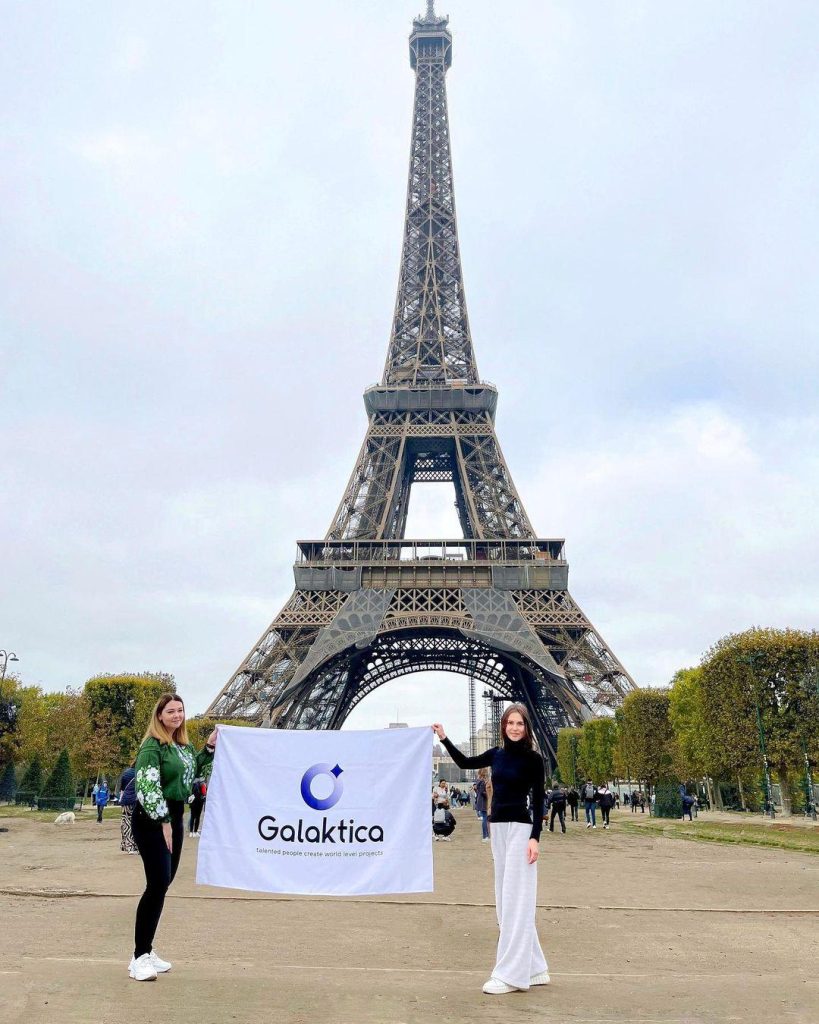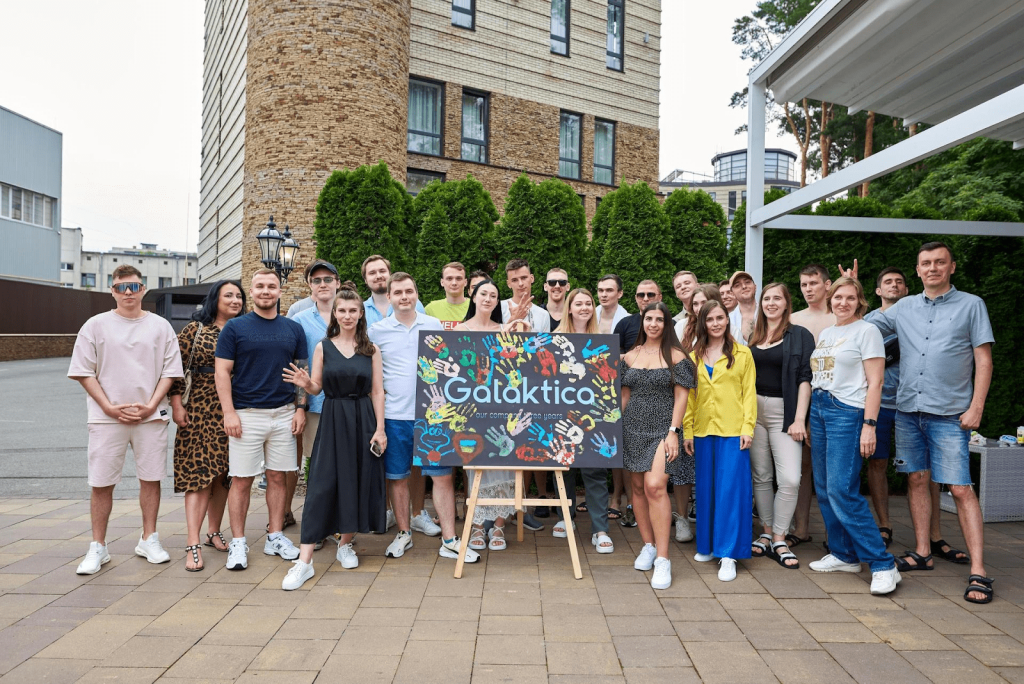Formule of efficient recruitment: more automatization – more candidates – more closed vacancies. Experience of Galaktica
About the client
 Galaktica has been successfully working on its own product for creating high-load social media projects. It started its journey in 2019, and since then, the team has grown from zero to more than 100 specialists from various industries.
Galaktica has been successfully working on its own product for creating high-load social media projects. It started its journey in 2019, and since then, the team has grown from zero to more than 100 specialists from various industries.
Today, Galaktica continues to scale, having launched a profitable product and cooperating with clients in the most solvent, powerful markets of the US, Canada, the UK, Australia, Asia countries, etc. The company’s main goal is to build a powerful international IT holding company, and it is already making progress in this direction.
Today, Galaktica inspires and unites the best specialists in web development and design, marketing and analytics. At the same time, the HR department does everything possible to ensure that the team is filled with people who will definitely be its unconditional value and future assets. HR manager Nataliia Kovalenko and recruiter Valeriia Rudenko told us how this happens at Galaktica.
How Galaktica works today: recruitment features
 As Nataliia says, Galaktica has long chosen a hybrid and rather compromise format of work: all specialists work remotely, but they can always come to offices or coworking spaces in Kyiv and Lviv if they wish. This year, the team also opened a new office in Cyprus.
As Nataliia says, Galaktica has long chosen a hybrid and rather compromise format of work: all specialists work remotely, but they can always come to offices or coworking spaces in Kyiv and Lviv if they wish. This year, the team also opened a new office in Cyprus.
The company is currently growing and scaling up rapidly, despite the war and a certain crisis in the labour market. Galaktica has about 10+ vacancies open every month, which are always in demand and receive hundreds of responses.
The HR department currently consists of 5 recruiters, 2 HR managers, and 1 sourcer. An L&D manager has also recently joined the team.
Each recruiter maintains its own pool of vacancies, but some of them can overlap and be processed collectively.
The range of current vacancies is quite wide and of any level of complexity – from moderator to COO.
Depending on the type of position, the search platform is also chosen. But most often it is LinkedIn, DOU, Djinni, as well as Robota.ua and Work.ua.
For a specific vacancy, Galaktica recruiters can use professional channels on Telegram, and they are always active in advertising vacancies on Instagram. According to their experience, Instagram can be a very effective search channel if you set up the right and balanced communication.
Galaktica actively works with a referral programme, both external and internal. HR and recruiters collect recommendations, and always take into account those candidates with whom they have had the opportunity to communicate before.
The most difficult vacancy in recent months has been the Chief Operating Officer (COO). The easiest one is a moderator or a support person, which can be closed in a week and a half.
Developers are usually much more difficult. Marketing areas such as PPC and Media Buyer are also being closed on a regular basis
To get admitted to Galaktica’s warm team, a candidate has to go through 3, sometimes 4 stages of interviews – with a recruiter, his or her future manager, and the company’s CEO (a test task is rarely used).
Why did we switch to CleverStaff?
Galaktica and CleverStaff have been working together since March 2023. Prior to CleverStaff, the company’s recruiters had experience with automated software, but it covered only basic needs, was not convenient enough, lacked modern features, and did not encourage consistency. “Candidates were coming in, we processed them, moved them through the funnels, but there was no way to track them, communicate effectively, see analytics,” Natalia says.
 When a few more recruiters joined the team, there was no longer a need, but a necessity for more powerful and multifunctional software. After all, the company is growing rapidly, it is necessary to maintain its database, add more and more candidates, systemise all the information, conduct analytics, etc. In simple words, the formula “More vacancies – more recruiters – more automation” worked.
When a few more recruiters joined the team, there was no longer a need, but a necessity for more powerful and multifunctional software. After all, the company is growing rapidly, it is necessary to maintain its database, add more and more candidates, systemise all the information, conduct analytics, etc. In simple words, the formula “More vacancies – more recruiters – more automation” worked.
As Valeriia says, one of Galaktica’s vacancies on DOU can receive more than 200 responses. The number of profiles on LinkedIn that she looks through to find “the right candidate” is hard to count. Valeriia also conducts about 45 HR interviews a month. Of course, it all depends on the position, but such an array of incoming information cannot be overcome with a notebook, Excel, or some home-made ATS – you need radical, uncompromising automation ☺
6 tools that impress in the new software
- Support and approach to the client. Recruiters receive a prompt and complete answer to every request or question about the system’s operation – a presentation, screens, recommendations and explanations are sent.
- User friendly interface. Working with the admin panel is intuitively easy even for those recruiters who have no experience with automated software. Everything is clear what to do and how to do it. Available analytics and convenient report generation, with the ability to select the necessary criteria are pleasing.
- The algorithm of profile matching. It is about identifying “duplicate” candidates during the process. We have had experience when other software does not identify them, and it is inconvenient. Instead, CleverStaff analyses, compares, and recognises duplicates. That is, the issue of the uniqueness of profiles is closed, and this is good.
- Easy saving of profiles from different resources. It’s convenient when you can save a profile through a widget when sourcing on Linkedin, working with DOU and Djinni without any additional actions. This is a cool thing, the only thing is that there is a small question about the speed of this widget. It would be great if it could be sped up over time.
- Integration with job boards such as Work.ua, Robota.ua, and others. It is very convenient when you can pull up in one action, “in one click”. A cool automated approach.
- Gamification. Prizes, awards, and rankings are really cool for beginner recruiters, and if you want to compete with colleagues ☺.
A separate issue is analytics and reporting
 Valeriia believes that when a company scales up, a recruiter should keep a close eye on recruitment analytics. This applies to both individual questions about the vacancy (for example, how many interviews and calls were held in a week) and general analytics. Let’s be honest – if a vacancy has been open for 3 months, no recruiter will remember its operational nuances and history – calls, interviews, etc., and you can easily see and analyse your workload for this position in general.
Valeriia believes that when a company scales up, a recruiter should keep a close eye on recruitment analytics. This applies to both individual questions about the vacancy (for example, how many interviews and calls were held in a week) and general analytics. Let’s be honest – if a vacancy has been open for 3 months, no recruiter will remember its operational nuances and history – calls, interviews, etc., and you can easily see and analyse your workload for this position in general.
By the way, to make the candidate’s story as complete and understandable as possible for colleagues working on the same vacancy, recruiters will always leave their comments – this is in the status of a “must have”.
It’s also important that analytics gives recruiters the opportunity to see when something has gone wrong and take the necessary measures. Find a solution to adjust your actions in the future. You can clearly see what exactly is out of the normal course of events in recruitment – and you can influence it. If you have this information, you have an action plan.
From the HRD point of view, Mariia monitors the dynamics of closing vacancies more globally according to her metrics, pays attention to how many candidates accepted/rejected the offer for a specific period, analyses the achievements and success of each recruiter separately, etc. These figures are important for discussing achievements or problems in the recruitment process at meetings, especially in order to influence vacancies that are slow to fill.
Recruitment today and tomorrow
For our part, let’s assume that Galaktica’s decision to automate itself will prove to be correct in 2024. Why? Here is an interesting fact.
According to Valeriia’s forecast, outsourcing companies, the driving force of Ukrainian IT, will develop strongly in the new year. Because, working in the extremely difficult conditions of war and blackouts in Ukraine, they have adapted and proved to their foreign customers that they can do everything and even more, maintaining current and getting new profitable projects. They will need more new forces, new people. The number of new jobs will grow cautiously and slowly, which means that the recruiter will get more workload and will have to hunt for talent in the literal sense.
And this is where another formula can come in – “More automation – more candidates – more closed vacancies”. Because recruiters will not spend their energy and skills on routine tasks that can be easily delegated to software, but will focus on smart tasks. For example, to get ahead of industry colleagues, find the best and give your company a breakthrough result that the team will appreciate.
